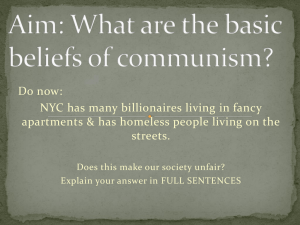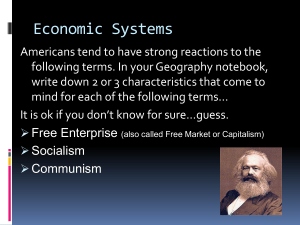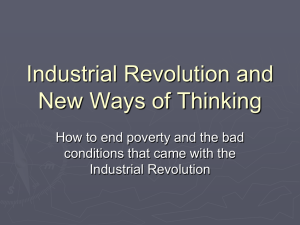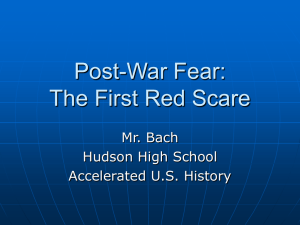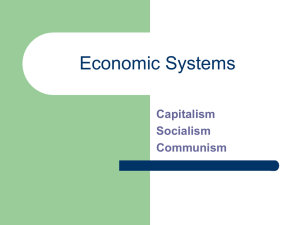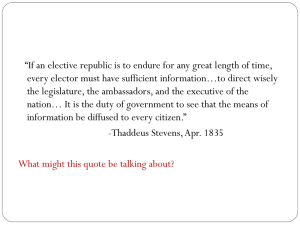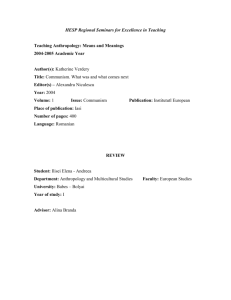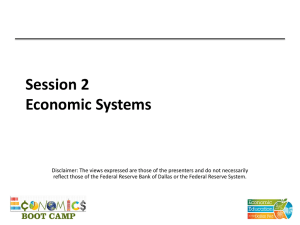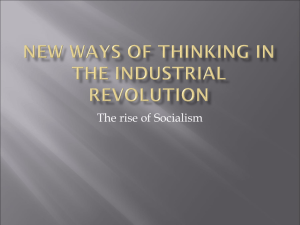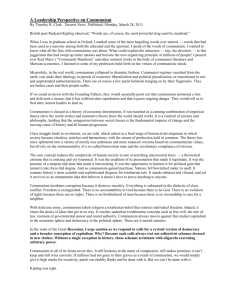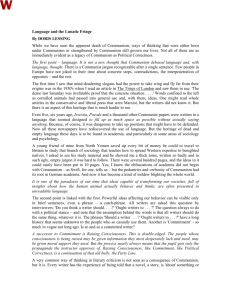Isms List - the Mr. Klein Grapevine
advertisement
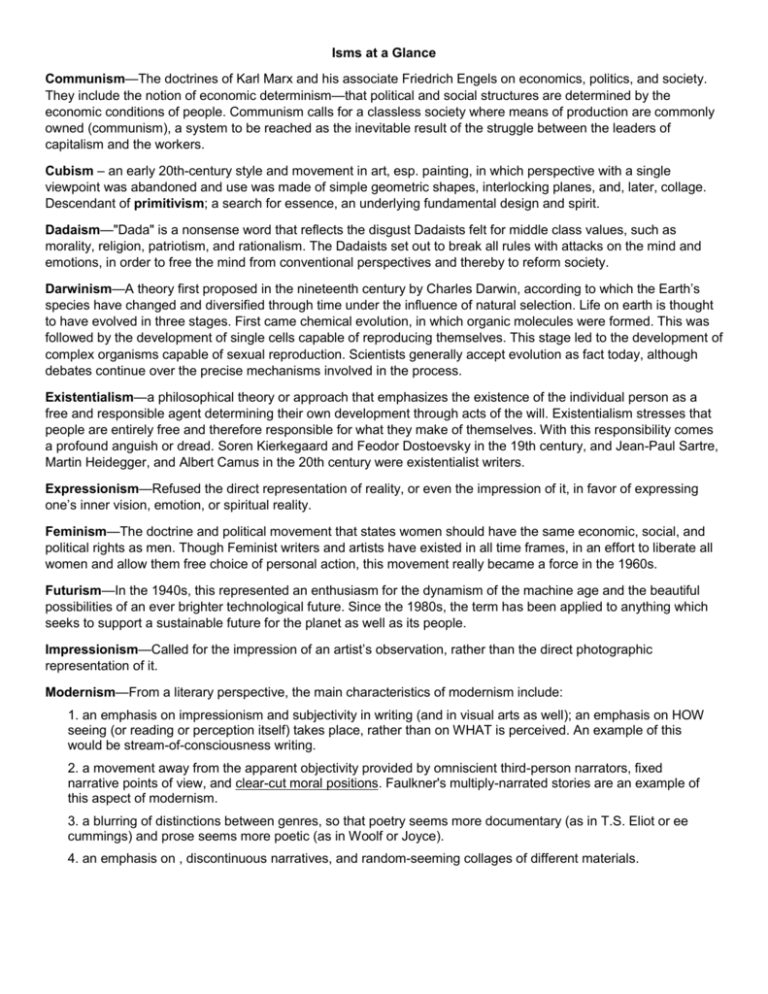
Isms at a Glance Communism—The doctrines of Karl Marx and his associate Friedrich Engels on economics, politics, and society. They include the notion of economic determinism—that political and social structures are determined by the economic conditions of people. Communism calls for a classless society where means of production are commonly owned (communism), a system to be reached as the inevitable result of the struggle between the leaders of capitalism and the workers. Cubism – an early 20th-century style and movement in art, esp. painting, in which perspective with a single viewpoint was abandoned and use was made of simple geometric shapes, interlocking planes, and, later, collage. Descendant of primitivism; a search for essence, an underlying fundamental design and spirit. Dadaism—"Dada" is a nonsense word that reflects the disgust Dadaists felt for middle class values, such as morality, religion, patriotism, and rationalism. The Dadaists set out to break all rules with attacks on the mind and emotions, in order to free the mind from conventional perspectives and thereby to reform society. Darwinism—A theory first proposed in the nineteenth century by Charles Darwin, according to which the Earth’s species have changed and diversified through time under the influence of natural selection. Life on earth is thought to have evolved in three stages. First came chemical evolution, in which organic molecules were formed. This was followed by the development of single cells capable of reproducing themselves. This stage led to the development of complex organisms capable of sexual reproduction. Scientists generally accept evolution as fact today, although debates continue over the precise mechanisms involved in the process. Existentialism—a philosophical theory or approach that emphasizes the existence of the individual person as a free and responsible agent determining their own development through acts of the will. Existentialism stresses that people are entirely free and therefore responsible for what they make of themselves. With this responsibility comes a profound anguish or dread. Soren Kierkegaard and Feodor Dostoevsky in the 19th century, and Jean-Paul Sartre, Martin Heidegger, and Albert Camus in the 20th century were existentialist writers. Expressionism—Refused the direct representation of reality, or even the impression of it, in favor of expressing one’s inner vision, emotion, or spiritual reality. Feminism—The doctrine and political movement that states women should have the same economic, social, and political rights as men. Though Feminist writers and artists have existed in all time frames, in an effort to liberate all women and allow them free choice of personal action, this movement really became a force in the 1960s. Futurism—In the 1940s, this represented an enthusiasm for the dynamism of the machine age and the beautiful possibilities of an ever brighter technological future. Since the 1980s, the term has been applied to anything which seeks to support a sustainable future for the planet as well as its people. Impressionism—Called for the impression of an artist’s observation, rather than the direct photographic representation of it. Modernism—From a literary perspective, the main characteristics of modernism include: 1. an emphasis on impressionism and subjectivity in writing (and in visual arts as well); an emphasis on HOW seeing (or reading or perception itself) takes place, rather than on WHAT is perceived. An example of this would be stream-of-consciousness writing. 2. a movement away from the apparent objectivity provided by omniscient third-person narrators, fixed narrative points of view, and clear-cut moral positions. Faulkner's multiply-narrated stories are an example of this aspect of modernism. 3. a blurring of distinctions between genres, so that poetry seems more documentary (as in T.S. Eliot or ee cummings) and prose seems more poetic (as in Woolf or Joyce). 4. an emphasis on , discontinuous narratives, and random-seeming collages of different materials. Naturalism—Similar to Realism, but with greater emphasis on analogies to science, especially to the influence of scientific materialism and determinism with a stress on heredity and environment. It was secular in its thrust. Aimed at accuracy and objectivity, and cultivated realistic and even sordid portrayals of people and their environment. As a literary movement, it was primarily found in 19th-century French literature and was anti-Romantic. Philosophical naturalism, which is often identified with materialism, holds that minds, spirits, and ideas are fundamentally material. Nihilism -- the rejection of all religious and moral principles, often in the belief that life is meaningless. Absurdism – meaning does not exist. Therefore it is absurd to look for it; Myth of Sisyphus. Postmodernism – a late-20th-century style and concept in the arts, architecture, and criticism that represents a departure from modernism and has at its heart a general distrust of grand theories and ideologies as well as a problematical relationship with any notion of “art.” Pragmatism—An approach to philosophy, primarily held by American philosophers in the late 19th century, which asserts that the truth or meaning of a statement is to be measured by its practical (i.e., pragmatic) consequences. (Another way of defining pragmatism is to say, "A theory is good if it works.") Psychologist William James and educator John Dewey were pragmatists. Progressivism – reform movement; responsible for clean food, controlled drugs, women’s rights. Realism—Valued a truthful representation of life "as it is" in literature, including that which is low, vile, sordid, disgusting, and evil. The personality of the author was supposed to recede into the background. (Primarily found in 19th-century French literature and was anti-Romantic.) Relativism – the doctrine that knowledge, truth, and morality exist in relation to culture, society, or historical context, and are not absolute. The end of absolutes – God is dead. Everything is relative. Socialism—An economic and political system based on public or collective ownership of the means of production. Socialism emphasizes equality rather than achievement, and values workers by the amount of time they put in rather than by the amount of value they produce. A stage between capitalism and pure communism. Surrealism—Echoed Dadaism in its desire to free the mind from convention and open it to new possibilities. The Surrealists experimented with ways of liberating the unconscious imagination and thereby reaching a sublime state they called the "marvelous." Examples include dream-writing, automatic writing, riddle games, collage, and startling images yoking unrelated elements, thereby suggesting buried connections and possible relationships unexamined by the conscious mind. (A Surrealist joke goes this way: Question: How many Surrealists does it take to change a light bulb? Answer: Two: One to hold the giraffe, and the other to fill the bathtub with brightly colored machine tools.) Totalitarianism dictatorship: a form of government in which the ruler is an absolute dictator (not restricted by a constitution or laws or opposition etc.) Fascism; Soviet-style socialism or communism; Nazism—A system of political philosophy developed by Adolph Hitler in Germany that demanded absolute devotion to the German government and that opposed communism, capitalism, and free intellectual inquiry and attempted to establish a "master race" of people of "pure" descent that would rule the world. The Nazis exterminated Jews, gypsies, Slavs, communists, homosexuals, Christians who resisted the government, and defenders of intellectual freedom.
